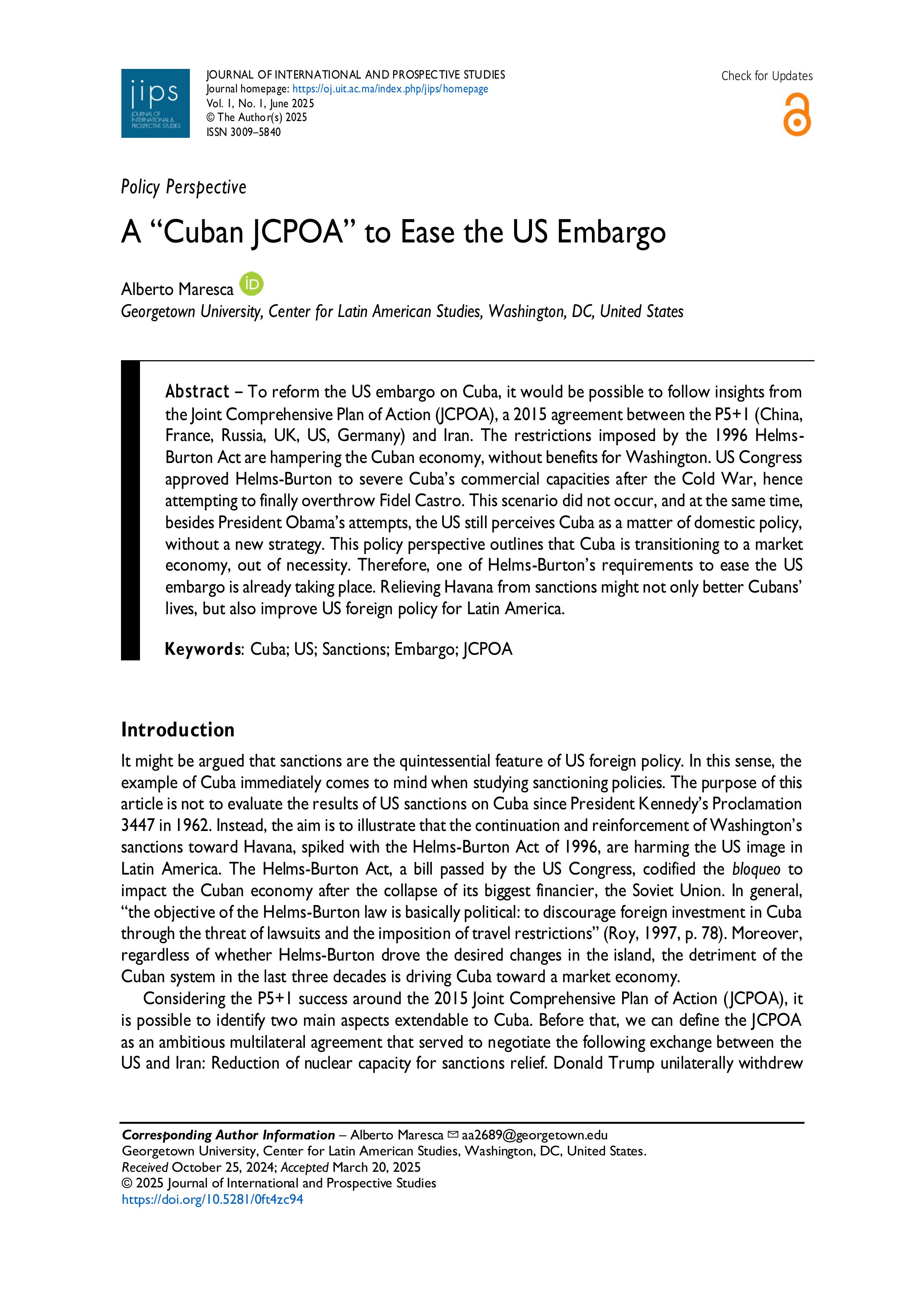A “Cuban JCPOA” to Ease the US Embargo
DOI:
https://doi.org/10.5281/0ft4zc94Keywords:
Cuba, US, Sanctions, Embargo, JCPOAAbstract
To reform the US embargo on Cuba, it would be possible to follow insights from the Joint Comprehensive Plan of Action (JCPOA), a 2015 agreement between the P5+1 (China, France, Russia, UK, US, Germany) and Iran. The restrictions imposed by the 1996 Helms-Burton Act are hampering the Cuban economy, without benefits for Washington. US Congress approved Helms-Burton to severe Cuba’s commercial capacities after the Cold War, hence attempting to finally overthrow Fidel Castro. This scenario did not occur, and at the same time, besides President Obama’s attempts, the US still perceives Cuba as a matter of domestic policy, without a new strategy. This policy perspective outlines that Cuba is transitioning to a market economy, out of necessity. Therefore, one of Helms-Burton’s requirements to ease the US embargo is already taking place. Relieving Havana from sanctions might not only better Cubans’ lives, but also improve US foreign policy for Latin America.
Downloads
References
Congressional Research Service. (2021). State Sponsors of Acts of International Terrorism —legislative parameters: In brief. (No. R43835). https://crsreports.congress.gov/product/pdf/R/R43835/21.
Congressional Research Service. (2022). Iran sanctions. (No. RS20871). https://crsreports.congress.gov/product/pdf/RS/RS20871.
Cuban Ministry of Foreign Affairs. (2024, October 23). Letter in New York Times demands reversal of brutal policy on Cuba. http://cubaminrex.cu/en/letter-new-york-times-demands-reversal-brutal-policy-cuba.
Dadpay, A., & Tabrizy, S. S. (2021). Political agreements and exporting activities: An empirical assessment of the effects of the JCPOA agreement on Iran’s exports. Comparative Economic Studies, 63(1), 147–180. https://doi.org/10.1057/s41294-020-00136-x.
European External Action Service. (2023, November 2). EU explanation of vote – UN General Assembly: Embargo imposed by the USA against Cuba. https://www.eeas.europa.eu/delegations/un-new-york/eu-explanation-vote-%E2%80%93-un-general-assembly-embargo-imposed-usa-against-cuba_en?s=63.
Financial Times. (2024, October 13). ‘China is not Cuba’s sugar daddy’: Ties between communist nations weaken. https://www.ft.com/content/9ca0a495-d5d9-4cc5-acf5-43f42a9128b4.
Friedman, M. P. (2012). Rethinking anti-Americanism: The history of an exceptional concept in American foreign relations. Cambridge University Press.
Galbraith, J. (2019). Trump Administration announces withdrawal from four international agreements. The American Journal of International Law, 113(1), 132–141. https://www.jstor.org/stable/26569020.
Gimmon, E., & Felzensztein, C. (2023). The emergence of family entrepreneurship in the transition economy of Cuba. International Journal of Emerging Markets, 18(9), 2239–2258. https://doi.org/10.1108/IJOEM-09-2020-1099.
Heo, J. Y. (2023). The Iran nuclear deal (JCPOA) and implications for the North Korean nuclear crisis. Journal of Asian and African Studies, 1–15. https://doi.org/10.1177/00219096231207895.
Holland & Knight. (2024, May 29). OFAC amends regulations to support Cuban people, independent private-sector entrepreneurs. https://www.hklaw.com/en/insights/publications/2024/05/ofac-amends-regulations-to-support-cuban-people.
Lamrani, S. (2021). Conversaciones con Ignacio Ramonet. Études Caribéennes, 7, 1–14. https://doi.org/10.4000/etudescaribeennes.22340.
LeoGrande, W. M. (1997). Enemies evermore: US policy towards Cuba after Helms-Burton. Journal of Latin American Studies, 29(1), 211–221. https://doi.org/10.1017/S0022216X96004683.
López-Levy, A., & Abrahams, H. S. (2010). Anything but human rights: US policy towards Cuba under Helms-Burton. International Journal of Cuban Studies, 2(3/4), 315–334. https://www.jstor.org/stable/41945910.
Napier, M. (2010). The Cuban embargo: Detrimental to Cuba, the United States, and democracy. Sigma: Journal of Political and International Studies, 27(1), 59–67. https://scholarsarchive.byu.edu/sigma/vol27/iss1/6/.
New York Times. (2024, October 18). Power outage plunges all of Cuba into darkness. https://www.nytimes.com/2024/10/18/world/americas/cuba-power-plant-blackout.html.
Romanò, S., & Barrera, D. (2021). The impact of market-oriented reforms on inequality in transitional countries: New evidence from Cuba. Socio-Economic Review, 19(2), 765–787. https://doi.org/10.1093/ser/mwz016.
Roy, J. (1997). The Helms-Burton law: Development, consequences, and legacy for inter-American and European-US relations. Journal of Interamerican Studies and World Affairs, 39(3), 77–108. https://doi:10.2307/166486.
Salazar, M. E. (2024, May 10). Salazar and Huizenga press Biden Administration on “Mipyme Loophole” to evade Cuba sanctions. Congress of the United States. http://salazar.house.gov/media/press-releases/salazar-and-huizenga-press-biden-administration-mipyme-loophole-evade-cuba.
Sánchez, Y. (2018). La salida de Raúl Castro, el fin de una era. Política Exterior, 32(181), 6–12. https://www.jstor.org/stable/26452006.
Tehran Times. (2024, June 30). Where Pezeshkian and Jalili stand on key issues. https://www.tehrantimes.com/news/500482/Where-Pezeshkian-and-Jalili-stand-on-key-issues.
Triana Cordoví, J. (2021). Alianzas público-privadas en Cuba: retos y posibilidades. Economía y Desarrollo, 165(2), 1–28. http://scielo.sld.cu/scielo.php?script=sci_abstract&pid=S0252-85842021000400002&lng=es&nrm=iso&tlng=es.
U.S. Department of State. LIBERTAD Act. (2000, January 20). https://1997-2001.state.gov/regions/wha/cuba/helms.html.
Wilner, G. (1993). International reaction to the Cuban Democracy Act. Florida Journal of International Law, 8(3), 401–414. https://scholarship.law.ufl.edu/fjil/vol8/iss3/4.
Xinhua. (2021, April 17). Raul Castro announces retirement as head of Communist Party of Cuba. http://www.xinhuanet.com/english/northamerica/2021-04/17/c_139886845_2.htm.

Downloads
Published
Issue
Section
License
Copyright (c) 2025 Alberto Maresca (Author)

This work is licensed under a Creative Commons Attribution-NonCommercial 4.0 International License.

